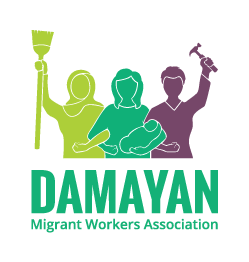Labor trafficking survivor and leader reunites with four children after 10 years
In February, Damayan leader and labor trafficking survivor Judith Daluz was reunited with her four children, whom she left in the Philippines ten years ago.
Judith was working as a balut (duck embryo) vendor back home. But like the more than 4,000 Filipino workers who leave the Philippines every day, the lack of income and job opportunities forced Judith to seek employment overseas. She came to New York City in 2005 to work as a domestic worker for a Japanese diplomat’s family.
Her diplomat employer promised her $1800/month, paid holidays, and other benefits. Instead, she worked for 14-18 hours/day for $500/month, cleaned their home with four bedrooms and three bathrooms, washed and ironed their clothes, cooked breakfast and dinner, and took care of the daughter. She wasn't given any days off, her passport was taken, and the mother and daughter physically hit her.
After enduring this abusive condition for months, Judith escaped from her employers in 2006. In 2013, a friend and Damayan member introduced her to Damayan, who referred her to a pro bono lawyer and helped her access services for labor trafficking survivors. Judith was able to get a T visa (humanitarian visa for trafficking survivors) and bring her children to the US. She has been an active and vocal leader, telling her story to community members to encourage workers to come forward and fight trafficking.
Labor trafficking is an outrage. As the top source country of women to serve in diplomat homes, the Philippines falls far short in protecting Filipino nationals overseas. The Philippine economy relies on overseas workers' remittances to remain afloat, with over half of remittances coming from the United States. Meanwhile, Philippine Consulate and Missions in the US have no clear protocols to assist or provide resources to Filipino workers in distress.
Damayan fights for Filipino labor trafficking survivors through its campaign, Baklas: End Labor Trafficking and Modern Day Slavery. It aims to give immediate assistance to domestic worker survivors while addressing the systemic issues that breed labor trafficking. Damayan is calling upon the Philippine Consulate and Mission in New York, through its current Consul General, Mario de Leon, to sign a robust Memorandum of Agreement with Damayan detailing protocols and resources for Filipino trafficking survivors.
Negotiations between Damayan and the Philippine Consulate are now in their second year. The time to fight labor trafficking of Filipino domestic workers is now!
